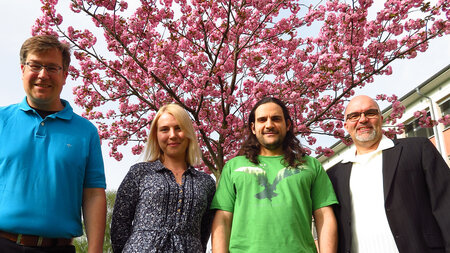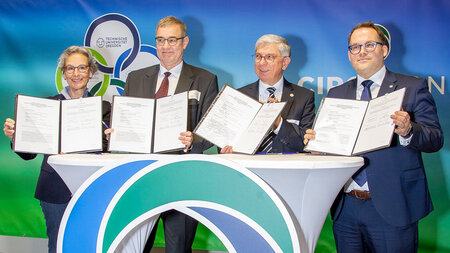
Catalan Studies at TU Chemnitz

At TU Chemnitz, Catalan is based at the Chair of Cultural and Social Change. This chair was established in 2004 at the Institute for European Studies with a focus on historical and contemporary research on cultural and social phenomena on the Iberian Peninsula, taking into account the region’s linguistic and cultural diversity (Basque Country, Galicia, Catalonia, Portugal and Spain). The Catalan-speaking areas thus form an integral part of Iberian studies at Chemnitz. Recently, Dr Núria Codina, associate professor at the chair from 2008 to 2017, completed her PhD on transculturality in the works of German and Catalan-speaking authors (Verflochtene Welten. Transkulturalität in den Werken von Najat El Hachmi, Pius Alibek, Emine Sevgi Özdamar und Feridun Zaimoğlu, Würzburg: Königshausen & Neumann, 2018). Dr Silke Hünecke, who wrote her dissertation on the memory of the civil war in Catalonia, Cantabria, Andalusia, the Basque Country and Madrid (Die Überwindung des Schweigens. Verdrängte Geschichte, politische Repression und kollektives Trauma als Gegenstand der Arbeit der erinnerungspolitischen Bewegung im spanischen Staat, Münster: Edition Assemblage, 2015), has been teaching and researching at the Chair of Cultural and Social Change since 2017. Her habilitation project deals with women who were active in the political resistance against the dictatorship in late Francoism. The research project also takes into account regional differences between Catalonia, Madrid and the Basque Country with regard to everyday life under the dictatorship, repression as well as resistance organizations and forms of protest.
In teaching, Catalonia is taught within European Studies, European History and Intercultural Communication study programmes (in specialized courses such as: "Catalonia Today: From Ongoing Conflict to Hopeless Crisis?", "Independence Aspirations in Catalonia: Historical and Socio-political Factors, Identity Policies and the Current Conflict"; "Catalonia: Towards a Nation State?"; "Jo no sóc espanyol! Regionalism and Nationalism in Spain"; "Multilingualism in Europe"). Catalan studies also form part of courses related to overarching transversal aspects of the Iberian Peninsula (in the lecture "Introduction to Iberian Studies" or in courses such as "Representations of Collective Identity in the Iberian Peninsula: Literary and Media Self-images"; "Iberian Migration "; "Iberian Memory Studies"; "Concepts of Europe in the Iberian Culture"; "Spain – Between Centralism and Cultural Diversity"; "Migrant Women in Spanish Film"; "Contemporary Phenomena in the Iberian Peninsula"; "The Holocaust in Spanish and Portuguese Memories"; "The Transition to Democracy in the Iberian Peninsula").
Study trips to Catalonia ("Crises and Social Movements in Barcelona in the 21st Century", Silke Hünecke and Ana Troncoso, 2017; "Catalonia as an Intercultural Society", Núria Codina and Anke Streu, 2013), Erasmus partnerships with Catalan universities and guest lectures at TU Chemnitz (“After the Referendum and before the Judgment: The Political Situation in Catalonia Today”, 2019; "The Independence Movement in Catalonia – Back to the Small State in Europe?", 2018; "Catalonia: A New State in Europe?", 2013; "Who Speaks When What? Multilingualism in Catalonia", 2013) ensure that Catalonia is a steady presence in Chemnitz. In 2018 Dr Esther Gimeno Ugalde (Boston College, University of Vienna) was a guest professor at the Chair of Cultural and Social Change, focusing on teaching in Catalonia with, among others, the course "The (Invisible) City – Barcelona in Visual Culture and Literature").
The Chair also launched a DAAD-sponsored cooperation project with the Universitat Pompeu Fabra (UPF) entitled "Managing Crises From Below? Civil Society Initiatives and Social Movements in the Context of the Current Crises in Europe". One of project’s outputs is a conference to be held in Barcelona in December 2020 focusing on the social (crisis) situation in Catalonia. The conference will include a discussion with civil society representatives of the independence movement on the current crisis in Catalonia, as well as a city tour of the anti-oyster movement 15-M and neighbourhood civic initiatives in Barcelona.

Chemnitz University of Technology receives a "StudyCheck Award 2024" and the "Top University 2024" certificate thanks to the very positive evaluations from its students and alumni – Additionally, Chemnitz University of Technology is the top state university in the live "Digital Readiness" ranking …

From April 23 on, the University Library presents “book gems“ of its „Historical Collections“ within an exhibition and on the occasion of the TUCday at April 27, 2024 …

A celebration of scientific exchange: young scientists Maria Saladina and Fabian Samad will meet Physics Nobel Laureates in Lindau from June 30, 2024 onwards, and have the opportunity to network with other young scientists from around the world …

The three Universities of Technology in Chemnitz, Dresden and Freiberg and the Zittau/Görlitz University of Applied Sciences signed the cooperation agreement for the joint establishment of the "Green Circular Economy" (CircEcon) research campus, which will receive over EUR 108M in funding …
We would like to invite you to our game evening! Whether you're an expert at Monopoly or just fancy …
Get in contact with interesting regional and nationwide employers. You have the possibility to find …
Chemnitz University of Technology has successfully participated in the …
A varied program with former members of the Collegium musicum and chamber …
The Graduation Celebration is one of the most beloved traditions at the TU Chemnitz. Brand new …
New students are greeted each year at the beginning of the winter semester in a cherished …